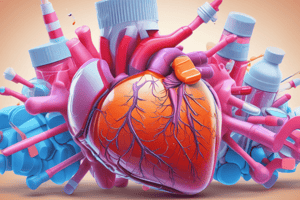Podcast
Questions and Answers
What is the classification of Isoptin (Verapamil)?
What is the classification of Isoptin (Verapamil)?
- Anticoagulant
- Antiarrhythmic
- Diuretic
- Calcium Channel Blocker (correct)
What is the primary indication for using Isoptin (Verapamil)?
What is the primary indication for using Isoptin (Verapamil)?
- Ventricular Tachycardia
- Hypertension
- Narrow Complex Tachycardia not responsive to Adenosine (correct)
- Atrial Fibrillation
What is the recommended adult dosage for Isoptin (Verapamil) IV administration?
What is the recommended adult dosage for Isoptin (Verapamil) IV administration?
- 10 - 20 mg IVP slow over 2 minutes (3 minutes in older patients), repeat 15 - 30 mg slow every 15 to 30 minutes, max dose 60 mg
- 5 - 10 mg IVP slow over 2 minutes (3 minutes in older patients), repeat 10 - 20 mg slow every 15 to 30 minutes, max dose 40 mg
- There is no recommended adult dosage for Isoptin (Verapamil) IV administration
- 2.5 - 5 mg IVP slow over 2 minutes (3 minutes in older patients), repeat 5 - 10 mg slow every 15 to 30 minutes, max dose 20 mg (correct)
Which of the following is a contraindication for the use of Isoptin (Verapamil)?
Which of the following is a contraindication for the use of Isoptin (Verapamil)?
What is the primary mechanism of action of Isoptin (Verapamil)?
What is the primary mechanism of action of Isoptin (Verapamil)?
Which of the following is a potential adverse reaction associated with the use of Isoptin (Verapamil)?
Which of the following is a potential adverse reaction associated with the use of Isoptin (Verapamil)?
What is the maximum recommended total dose of Isoptin (Verapamil) that can be administered intravenously?
What is the maximum recommended total dose of Isoptin (Verapamil) that can be administered intravenously?
How does Isoptin (Verapamil) affect the SA and AV nodes?
How does Isoptin (Verapamil) affect the SA and AV nodes?
Which of the following is a contraindication for the use of Isoptin (Verapamil)?
Which of the following is a contraindication for the use of Isoptin (Verapamil)?
Which of the following is Isoptin (Verapamil) primarily used to control?
Which of the following is Isoptin (Verapamil) primarily used to control?
What condition may be exacerbated by Isoptin (Verapamil) in patients with severe Left Ventricular Dysfunction?
What condition may be exacerbated by Isoptin (Verapamil) in patients with severe Left Ventricular Dysfunction?
Which syndrome is a contraindication for the use of Isoptin (Verapamil) due to speeding up accessory pathway conduction?
Which syndrome is a contraindication for the use of Isoptin (Verapamil) due to speeding up accessory pathway conduction?
In which type of heart block is Isoptin (Verapamil) contraindicated?
In which type of heart block is Isoptin (Verapamil) contraindicated?
How does Isoptin (Verapamil) affect atrial automaticity?
How does Isoptin (Verapamil) affect atrial automaticity?
What is the primary indication for using Isoptin (Verapamil)?
What is the primary indication for using Isoptin (Verapamil)?
Which syndrome is a contraindication for the use of Isoptin (Verapamil) due to speeding up accessory pathway conduction?
Which syndrome is a contraindication for the use of Isoptin (Verapamil) due to speeding up accessory pathway conduction?
How does Isoptin (Verapamil) affect atrial automaticity?
How does Isoptin (Verapamil) affect atrial automaticity?
Which of the following is a potential adverse reaction associated with the use of Isoptin (Verapamil)?
Which of the following is a potential adverse reaction associated with the use of Isoptin (Verapamil)?
Which of the following arrhythmias may benefit from Isoptin (Verapamil) administration?
Which of the following arrhythmias may benefit from Isoptin (Verapamil) administration?
What is the recommended intravenous dosing interval for Isoptin (Verapamil) in adults?
What is the recommended intravenous dosing interval for Isoptin (Verapamil) in adults?
Which of the following conditions is a contraindication for the use of Isoptin (Verapamil)?
Which of the following conditions is a contraindication for the use of Isoptin (Verapamil)?
Which of the following is a potential adverse reaction associated with Isoptin (Verapamil) administration?
Which of the following is a potential adverse reaction associated with Isoptin (Verapamil) administration?
How does Isoptin (Verapamil) exert its effects on cardiac conduction?
How does Isoptin (Verapamil) exert its effects on cardiac conduction?
What is the primary action mechanism of Isoptin (Verapamil)?
What is the primary action mechanism of Isoptin (Verapamil)?
Which of the following is a contraindication for the use of Isoptin (Verapamil)?
Which of the following is a contraindication for the use of Isoptin (Verapamil)?
What is one of the possible adverse reactions associated with Isoptin (Verapamil)?
What is one of the possible adverse reactions associated with Isoptin (Verapamil)?
In which of the following patients may Isoptin (Verapamil) exacerbate Congestive Heart Failure?
In which of the following patients may Isoptin (Verapamil) exacerbate Congestive Heart Failure?
What is the recommended dosing interval for repeat IV administration of Isoptin (Verapamil) in adults?
What is the recommended dosing interval for repeat IV administration of Isoptin (Verapamil) in adults?
What is the recommended dosing interval for repeat IV administration of Isoptin (Verapamil) in adults?
What is the recommended dosing interval for repeat IV administration of Isoptin (Verapamil) in adults?
Which cardiac syndromes are contraindications for the use of Isoptin (Verapamil) due to speeding up accessory pathway conduction?
Which cardiac syndromes are contraindications for the use of Isoptin (Verapamil) due to speeding up accessory pathway conduction?
What effect does Isoptin (Verapamil) have on the SA and AV nodes?
What effect does Isoptin (Verapamil) have on the SA and AV nodes?
Which condition may be exacerbated by Isoptin (Verapamil) in patients with severe Left Ventricular Dysfunction?
Which condition may be exacerbated by Isoptin (Verapamil) in patients with severe Left Ventricular Dysfunction?
What are the potential adverse reactions associated with Isoptin (Verapamil) administration?
What are the potential adverse reactions associated with Isoptin (Verapamil) administration?
What is the primary mechanism by which Isoptin (Verapamil) exerts its effects?
What is the primary mechanism by which Isoptin (Verapamil) exerts its effects?
Which of the following arrhythmias is not an indication for Isoptin (Verapamil)?
Which of the following arrhythmias is not an indication for Isoptin (Verapamil)?
What is the maximum recommended total intravenous dose of Isoptin (Verapamil) in adults?
What is the maximum recommended total intravenous dose of Isoptin (Verapamil) in adults?
Which of the following patient populations should be monitored closely when administering Isoptin (Verapamil)?
Which of the following patient populations should be monitored closely when administering Isoptin (Verapamil)?
What is the recommended initial intravenous dose of Isoptin (Verapamil) in adults?
What is the recommended initial intravenous dose of Isoptin (Verapamil) in adults?
Which of the following best describes the mechanism of action of Isoptin (Verapamil)?
Which of the following best describes the mechanism of action of Isoptin (Verapamil)?
Which of the following arrhythmias is not an indication for Isoptin (Verapamil)?
Which of the following arrhythmias is not an indication for Isoptin (Verapamil)?
Which of the following syndromes is a contraindication for Isoptin (Verapamil) due to the risk of speeding up accessory pathway conduction?
Which of the following syndromes is a contraindication for Isoptin (Verapamil) due to the risk of speeding up accessory pathway conduction?
What is the maximum recommended total intravenous dose of Isoptin (Verapamil) in adults?
What is the maximum recommended total intravenous dose of Isoptin (Verapamil) in adults?
Which of the following adverse reactions is associated with Isoptin (Verapamil) administration?
Which of the following adverse reactions is associated with Isoptin (Verapamil) administration?
Which of the following is a contraindication for the use of Isoptin (Verapamil)?
Which of the following is a contraindication for the use of Isoptin (Verapamil)?
What is the primary indication for using Isoptin (Verapamil)?
What is the primary indication for using Isoptin (Verapamil)?
How does Isoptin (Verapamil) affect atrial automaticity?
How does Isoptin (Verapamil) affect atrial automaticity?
In which of the following patients may Isoptin (Verapamil) exacerbate Congestive Heart Failure?
In which of the following patients may Isoptin (Verapamil) exacerbate Congestive Heart Failure?
What is the maximum recommended total intravenous dose of Isoptin (Verapamil) in adults?
What is the maximum recommended total intravenous dose of Isoptin (Verapamil) in adults?
What is the primary indication for using Isoptin (Verapamil)?
What is the primary indication for using Isoptin (Verapamil)?
In which type of heart block is Isoptin (Verapamil) contraindicated?
In which type of heart block is Isoptin (Verapamil) contraindicated?
Which syndrome is a contraindication for the use of Isoptin (Verapamil) due to the risk of speeding up accessory pathway conduction?
Which syndrome is a contraindication for the use of Isoptin (Verapamil) due to the risk of speeding up accessory pathway conduction?
What condition may be exacerbated by Isoptin (Verapamil) in patients with severe Left Ventricular Dysfunction?
What condition may be exacerbated by Isoptin (Verapamil) in patients with severe Left Ventricular Dysfunction?
Which of the following is a potential adverse reaction associated with Isoptin (Verapamil) administration?
Which of the following is a potential adverse reaction associated with Isoptin (Verapamil) administration?
Which type of tachycardia is Isoptin (Verapamil) primarily used to control?
Which type of tachycardia is Isoptin (Verapamil) primarily used to control?
What is the primary mechanism of action of Isoptin (Verapamil)?
What is the primary mechanism of action of Isoptin (Verapamil)?
Which of the following cardiac syndromes is a contraindication for the use of Isoptin (Verapamil)?
Which of the following cardiac syndromes is a contraindication for the use of Isoptin (Verapamil)?
Which adverse reaction is associated with Isoptin (Verapamil) administration?
Which adverse reaction is associated with Isoptin (Verapamil) administration?
In which patients may Isoptin (Verapamil) exacerbate Congestive Heart Failure (CHF)?
In which patients may Isoptin (Verapamil) exacerbate Congestive Heart Failure (CHF)?
What is the primary classification of Isoptin (Verapamil)?
What is the primary classification of Isoptin (Verapamil)?
Which type of tachycardia is Isoptin (Verapamil) primarily used to control?
Which type of tachycardia is Isoptin (Verapamil) primarily used to control?
Which of the following is a contraindication for the use of Isoptin (Verapamil)?
Which of the following is a contraindication for the use of Isoptin (Verapamil)?
How does Isoptin (Verapamil) affect the SA and AV nodes?
How does Isoptin (Verapamil) affect the SA and AV nodes?
What condition may be exacerbated by Isoptin (Verapamil) in patients with severe Left Ventricular Dysfunction?
What condition may be exacerbated by Isoptin (Verapamil) in patients with severe Left Ventricular Dysfunction?
Which of the following is the recommended initial intravenous dose of Isoptin (Verapamil) for adults?
Which of the following is the recommended initial intravenous dose of Isoptin (Verapamil) for adults?
Which of the following arrhythmias is not an indication for Isoptin (Verapamil)?
Which of the following arrhythmias is not an indication for Isoptin (Verapamil)?
Which syndrome is a contraindication for Isoptin (Verapamil) due to the risk of speeding up accessory pathway conduction?
Which syndrome is a contraindication for Isoptin (Verapamil) due to the risk of speeding up accessory pathway conduction?
What is the primary mechanism of action of Isoptin (Verapamil)?
What is the primary mechanism of action of Isoptin (Verapamil)?
Which of the following is a potential adverse reaction associated with Isoptin (Verapamil) administration?
Which of the following is a potential adverse reaction associated with Isoptin (Verapamil) administration?
What is a potential adverse reaction associated with Isoptin (Verapamil) administration?
What is a potential adverse reaction associated with Isoptin (Verapamil) administration?
Which syndrome is considered a contraindication for using Isoptin (Verapamil) due to the risk of speeding up accessory pathway conduction?
Which syndrome is considered a contraindication for using Isoptin (Verapamil) due to the risk of speeding up accessory pathway conduction?
Which action mechanism is attributed to Isoptin (Verapamil)?
Which action mechanism is attributed to Isoptin (Verapamil)?
In which type of heart block is the use of Isoptin (Verapamil) contraindicated?
In which type of heart block is the use of Isoptin (Verapamil) contraindicated?
What cardiac condition may be exacerbated by Isoptin (Verapamil) in patients with severe Left Ventricular Dysfunction?
What cardiac condition may be exacerbated by Isoptin (Verapamil) in patients with severe Left Ventricular Dysfunction?
Flashcards are hidden until you start studying


